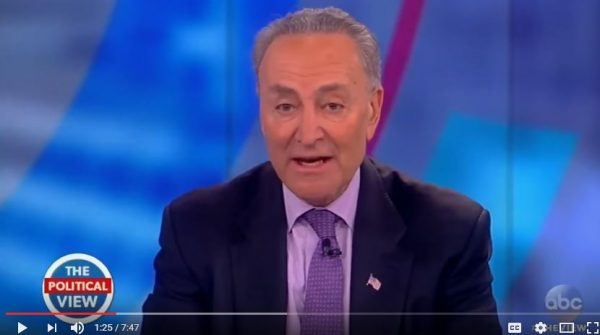
UPDATED: With members of the U.S. Senate lining up against one another on the confirmation of Judge Neil Gorsuch to the U.S. Supreme Court, the issue hiding in the shadows is protection of the Second Amendment as affirmed by the 2008 Heller and 2010 McDonald rulings.
Senate Republicans “detonated” the so-called “nuclear option” Thursday, restoring the ability to confirm nominations by a simple majority.
Perennial anti-gun Sen. Charles Schumer (D-NY) had been leading a filibuster effort to prevent the Gorsuch confirmation, according to NPR. He had argued that Gorsuch’s nomination should be withdrawn so the Senate could consider a nominee more acceptable to Democrats. But it was not to be.
NPR quoted him claiming that, “It’s on (Republican Sen. Mitch McConnell’s) shoulders and only on his shoulders” if the Republican majority invokes the so-called “nuclear option” that would change the rules to allow confirmation by a simple 51-vote majority.
But that’s wrong, and Schumer knows it. The “nuclear option” was originally employed by Democrats under former Sen. Harry Reid back in 2013 to push through several of Barack Obama’s nominees to the lower federal courts.
At the time, Politico quoted Obama stating something that could easily apply today:
“This isn’t obstruction on substance, on qualifications. It’s just to gum up the works.”
Thursday, Schumer and his cronies were gumming up the works. They expected to be in control on Capitol Hill this year, with Hillary “The-Supreme-Court-was-wrong-on-the-Second-Amendment” Clinton in the Oval Office making the high court nomination.
A recent Rasmussen survey found that nearly half of likely voters “believe opposition to President Trump’s first Supreme Court nominee is due mostly to partisan politics.”
With Gorsuch on the Supreme Court bench, rather than a liberal activist who might favor reversing Heller and McDonald, Second Amendment advocates can breathe a little easier, but only a little.
American gun owners cheered the Heller ruling nearly nine years ago because it affirmed that the Second Amendment delineates an individual right to keep and bear arms. That ruling, authored by the late Justice Antonin Scalia, whom Gorsuch will replace if confirmed, vindicated gun rights organizations that had argued vigorously for years against the so-called “collective interpretation” of the amendment as protective only of a state’s right to organize a militia.
Two years later, the McDonald ruling that nullified Chicago’s handgun ban and incorporated the Second Amendment to the states – a Second Amendment Foundation case – solidified the individual right interpretation. Changing the high court majority could easily jeopardize those rulings, and based on some lower federal court rulings, there still appear to be some judges who may not accept the Supreme Court’s wisdom.
President Donald Trump has the opportunity to level the lower court playing field. He’s got some 100 empty seats to fill. By drawing the line against Democrat obstructionism on the Gorsuch nomination, the Republican majority can send a strong message to Schumer & Company – including Washington Senators Patty Murray and Maria Cantwell – that they don’t get to “gum up the works.”
As it now stands, Gorsuch appears destined to become the next associate justice of the Supreme Court, filling a chair that has been vacant for some 15 months since the death of Justice Scalia early in 2016 while on a trip to Texas.
Related:
Anti-gun Schumer Threatens to Filibuster Gorsuch
Did Feinstein Quote Heller Out of Context to Play ‘Gotcha?’
Judiciary Dems Confirm Animosity Toward 2A in Gorsuch Hearing